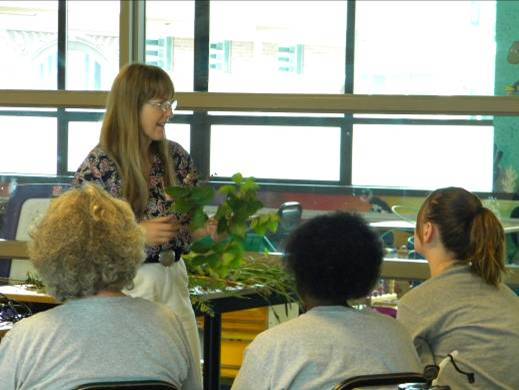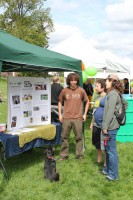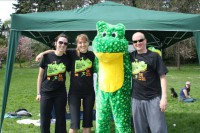by Fiona Edwards, SPP Graduate Research Assistant
On Wednesday, Washington Corrections Center for Women (WCCW) hosted Take Your Child to Work Day. SPP Graduate Research Assistants Brittany Gallagher, Bri Morningred, and Fiona Edwards joined the festivities.
At the suggestion of Paula Andrew, the Science and Sustainability Lecture Series lead staff member at WCCW, Brittany invited a popular SPP guest lecturer, Lynne Weber from West Sound Wildlife Shelter, back to visit the prison again. Ms. Weber gave a presentation about birds to the kids. She brought a great horned owl and a turkey vulture, both of which were hugely successful with the audience. Lynne explained how animals ended up in the care of the West Sound Wildlife Shelter, and how important it is to respect wildlife. Many questions were asked, my favorite being: “Will the turkey vulture get its license when it’s 16?”
Next up, Brittany and Bri did an exercise on the meaning and applications of sustainability, asking the kids to share their experiences with sustainable practices. Then I spoke about the Western pond turtles, which SPP is expecting to care for very soon. I attempted to explain the concept of shell rot (a disease which the turtles suffer from) without gory details, and when I asked how a healthy turtle’s shell is supposed to feel, one audience member told me, “It’s hard like a sandwich.” In the coming year, I’m hoping to get the sick turtles’ shells back to sandwich levels.
The Prison Pet Partnership came out next with two well-trained dogs. They showed the kids how they could help their future owners by flipping on light switches, closing doors, picking up fallen items, grocery shopping, and rolling on their backs so the owner could inspect for anything unusual. One excited audience member asked if the dogs could jump over the table, to which the head of the program replied that the dogs are in fact taught to jump: one of the dogs jumped over a cardboard box and inspired roaring applause.
After lunch, we helped the children color paper Taylor’s checkerspot butterfly wings and told them about the relationship between the Taylor’s checkerspot and the prairie plants. And even though we were not allowed to give away plugs of beautiful Castilleja hispida to those who asked, we had a great time; we hope we get to come back next year!




















 Gig Harbor, Wash.—Emphasizing the importance of sustainability, the horticulture program at
Gig Harbor, Wash.—Emphasizing the importance of sustainability, the horticulture program at  “Because each offender demonstrated a high capacity of responsibility for day-to-day farm activities, I decided to assign special projects for each lady,” Little said. “The project idea was a way for the offenders to take ownership of the farm, learn something new and educate each other on their respective projects. Being a part of the learning process was an enriching experience as a manager, and I look forward to working with Washington Corrections Center for Women to explore new boundaries, build knowledge and experiences and work together to fight hunger.”
“Because each offender demonstrated a high capacity of responsibility for day-to-day farm activities, I decided to assign special projects for each lady,” Little said. “The project idea was a way for the offenders to take ownership of the farm, learn something new and educate each other on their respective projects. Being a part of the learning process was an enriching experience as a manager, and I look forward to working with Washington Corrections Center for Women to explore new boundaries, build knowledge and experiences and work together to fight hunger.”


